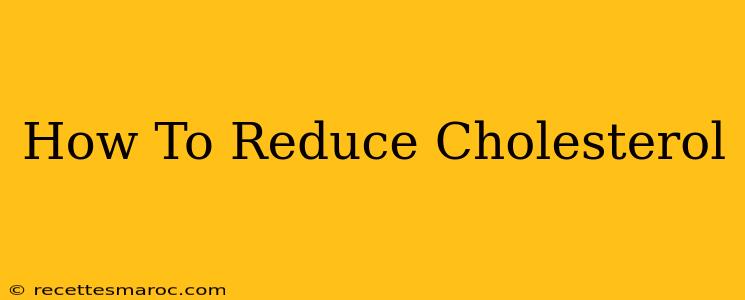High cholesterol is a serious health concern affecting millions worldwide. Understanding how to reduce cholesterol levels naturally and through medical intervention is crucial for maintaining heart health and overall well-being. This comprehensive guide explores effective strategies to lower your cholesterol and improve your cardiovascular health.
Understanding Cholesterol
Before diving into solutions, let's clarify what cholesterol is. Cholesterol is a waxy, fat-like substance found in your blood. While your body needs some cholesterol to function properly, high levels can lead to a buildup of plaque in your arteries, a condition known as atherosclerosis. This plaque buildup restricts blood flow, increasing your risk of heart attack, stroke, and other cardiovascular diseases. There are two main types of cholesterol:
- LDL Cholesterol ("bad" cholesterol): High levels of LDL cholesterol contribute to plaque buildup in your arteries.
- HDL Cholesterol ("good" cholesterol): HDL cholesterol helps remove cholesterol from your arteries, protecting against heart disease.
Your doctor will typically measure your total cholesterol, LDL cholesterol, HDL cholesterol, and triglycerides (another type of fat in your blood) to assess your cholesterol levels and risk factors.
Lifestyle Changes to Reduce Cholesterol
Many lifestyle modifications can significantly impact your cholesterol levels. These changes are often the first line of defense in managing high cholesterol and may even eliminate the need for medication in some cases.
1. Diet Plays a Crucial Role
Your diet is a powerful tool in managing cholesterol. Focus on incorporating these changes:
- Reduce Saturated and Trans Fats: These fats significantly raise LDL cholesterol. Limit consumption of red meat, processed foods, full-fat dairy products, and fried foods.
- Increase Soluble Fiber: Soluble fiber binds to cholesterol in your digestive tract, helping your body eliminate it. Excellent sources include oats, barley, apples, beans, and lentils.
- Eat More Fruits and Vegetables: Fruits and vegetables are packed with vitamins, minerals, and antioxidants that support overall health and can contribute to lower cholesterol.
- Choose Lean Protein Sources: Opt for lean meats like chicken breast or turkey, fish (especially fatty fish like salmon rich in Omega-3 fatty acids), and plant-based protein sources like beans, lentils, and tofu.
- Limit Added Sugar: Excessive sugar intake can negatively impact your cholesterol levels. Minimize consumption of sugary drinks, desserts, and processed foods with added sugar.
2. Exercise Regularly
Regular physical activity is essential for overall health and plays a vital role in lowering cholesterol. Aim for at least 150 minutes of moderate-intensity aerobic exercise or 75 minutes of vigorous-intensity aerobic exercise per week. Activities like brisk walking, swimming, cycling, or jogging are all beneficial.
3. Maintain a Healthy Weight
Being overweight or obese significantly increases your risk of high cholesterol. Losing even a small amount of weight can lead to noticeable improvements in your cholesterol levels. Combine a healthy diet with regular exercise to achieve and maintain a healthy weight.
4. Quit Smoking
Smoking damages blood vessels and increases LDL cholesterol. Quitting smoking is one of the best things you can do for your cardiovascular health and overall well-being.
5. Manage Stress
Chronic stress can contribute to various health problems, including high cholesterol. Practicing stress-management techniques like yoga, meditation, or deep breathing exercises can be beneficial.
Medical Interventions for High Cholesterol
If lifestyle changes aren't enough to lower your cholesterol to a healthy level, your doctor may recommend medication. Common cholesterol-lowering medications include:
- Statins: These are the most common type of cholesterol-lowering medication, effectively reducing LDL cholesterol.
- Bile Acid Sequestrants: These medications bind to bile acids in your digestive tract, preventing them from being reabsorbed and lowering LDL cholesterol.
- PCSK9 Inhibitors: These are newer medications that can significantly lower LDL cholesterol levels. They are usually reserved for patients with very high cholesterol or those who don't respond well to statins.
- Fibrates: These medications help lower triglycerides and raise HDL cholesterol.
Monitoring Your Cholesterol
Regular monitoring of your cholesterol levels is essential. Your doctor will recommend the frequency of testing based on your individual risk factors. By actively managing your cholesterol through lifestyle changes and, if necessary, medication, you can significantly reduce your risk of heart disease and live a healthier, longer life. Remember to always consult your doctor before making significant changes to your diet or starting any new medication. They can provide personalized advice based on your individual health needs and risk factors.

